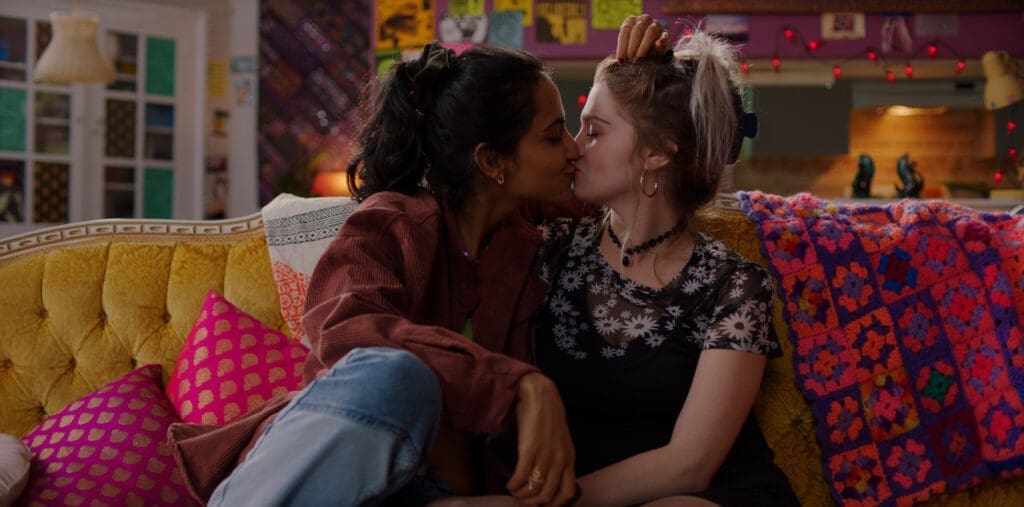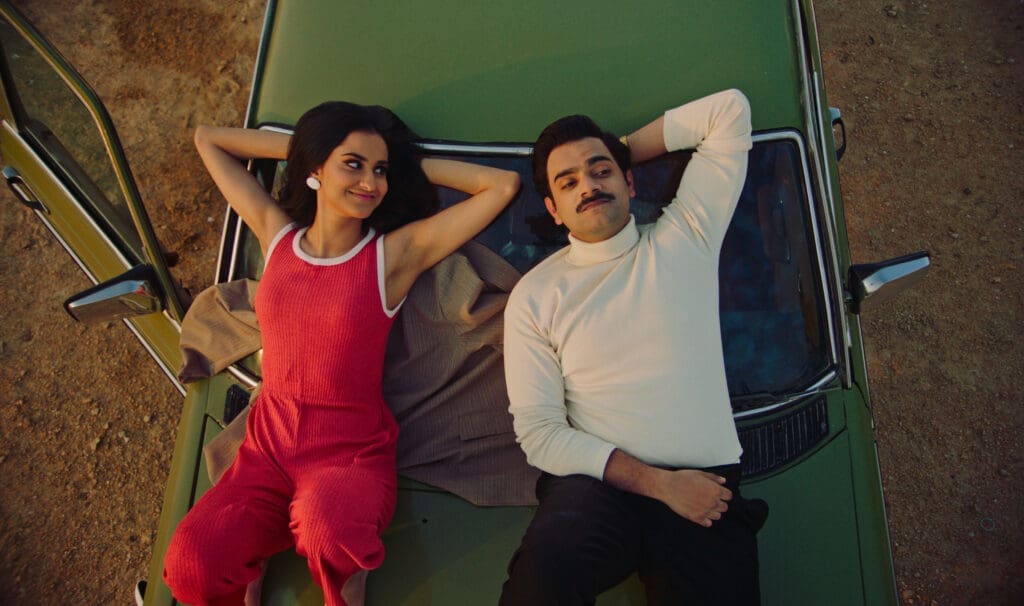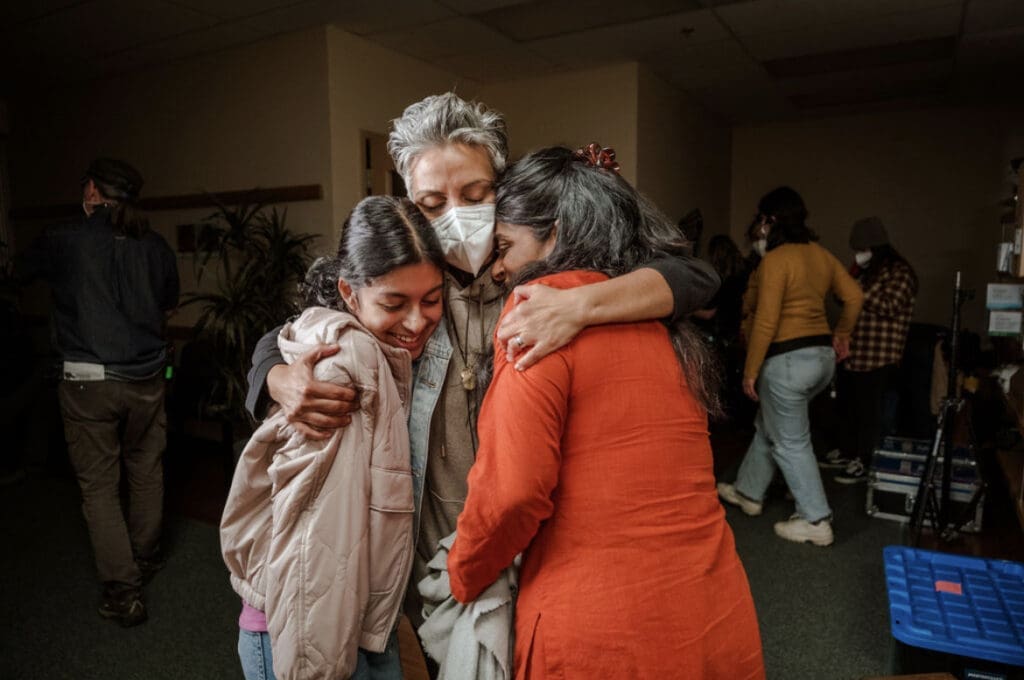Do you have a comfort movie Рthe kind you return to when you’re craving nostalgia or a little escape? In her semi-autobiographical debut feature, The Queen of My Dreams, writer-director Fawzia Mirza, explores the power of cinema and its ability to bridge generations and offer sanctuary in the face of loss.
In the wake of a devastating family tragedy, Azra (Amrit Kaur) returns to Pakistan. However, the intended reason for her return gets overshadowed by her fractured relationship with her estranged mother (Nimra Bucha). Through flashbacks, daydreams inspired by the 1969 Bollywood film, Aradhana, and a revelatory conversation with her ailing grandmother, Azra begins to reconnect with her culture and start to heal the deep wounds created by fear, religion, and identity. 
We sat down with Nimra Bucha, Ayana Manji, who plays younger Azra, and Hamza Haq, who plays the father, to chat about comfort movies, memories from filming, acting across multiple timelines.
In the film, Azra and Mariam bond over and find comfort in an the film, Aradhana. What is your comfort movie and why? 
Nimra: There’s so many.
Hamza: This is great because I feel like we’ve got three very particular tastes here, so I’d be surprised if there’s any crossovers or anything like that.¬†
Nimra: My 10 year old, he’s discovering cinema these days. So he’s watching, you know, highly inappropriate grown up Batman films, the Christopher Nolan ones and stuff.
[I also enjoy] anything that’s got a bit of a song and dance, if it’s Bollywood and if it’s proper funny, like proper 80s humor, I connect to that. And I think Fawzia is intuitively an 80s film writer. Don’t you think, Hamza?
Hamza: I think so, yeah, there’s a great amount homage being paid to that time of filmmaking and it’s quite nostalgic in that regard. I grew up watching a lot of those as well. But personally, my comfort movies, I gotta give it to The Mummy, Rush Hour, Step Brothers, you know, that early 2000s Will Ferrell Suite.
But honestly, the Nolan Batman movies. I was in a hotel room two days ago and I watched Batman Begins because I’m just like oh it’s on, let’s make this happen. I’ve seen The Prestige like forty times. I’m still like discovering new things about this movie. I think it’s just so well done. I wouldn’t consider it a comfort movie, but I try to put my head in that space and be like what did I miss last time? even though I know how it ends. In case you haven’t seen it, I’m not gonna ruin it.¬†
Ayana: I’ll go to Indian movies, because I’ve watched Dilwale Dulhania Le Jayenge like 70 times, I think, and I don’t even speak Hindi.

The film time travels through memories. Do you have any favorite memories from the making of the film?
Nimra: I would have been exactly around Ayana’s character’s age at that time in the 80s. So for me, it was really like time travel. Just walking into the house in Halifax, where we were shooting, it was so beautifully designed – it felt like a real home in the 80s. And just being around those clothes, those costumes, the kitchen stuff, the Pyrex dishes, all of that – I got to inhabit my childhood. And my Mother had a lot of those things.¬†
Ayana: There was one moment during shooting when I was at lunch with my set teacher. There were stairs leading up to the house- they were long, and we were just sitting there. Then, as different people came by, we were like, ‚ÄúHey, do you want to sit with us?‚ÄĚ And I think by the end, there were at least 20 or 30 people sitting and having lunch. And it was, I think, one of my most favorite moments, because we were all just kind of like a family, like a community. And I just remember that so vividly.
Hamza: I got to go back to Pakistan for the first time in almost 13 years. So for me, it was that‚ÄĒthere was a lot of nostalgia rooted there. I remember this one time when we were filming at the theater, we crossed this roundabout, and I was like‚ÄĒthere were just these landmarks I remembered from my childhood. There was a Nando‚Äôs and a Bundu Khan and everything like that.
We‚Äôre crossing this thing, and I asked my driver, ‚ÄúYo, is this in the Muslim Housing Society?‚ÄĚ And he‚Äôs like, ‚ÄúYeah, it is.‚ÄĚ And I was like, ‚ÄúDo we have time? Can we just drive up the road over there?‚ÄĚ
So I just knocked on my Phuppo’s door‚ÄĒmy Dad‚Äôs sister. I just knocked because I was like, ‚ÄúNo, no, no, it wasn‚Äôt the black gate.‚ÄĚ And obviously, it‚Äôs been 13 years‚ÄĒthey could‚Äôve painted the gate, you know? But I knocked and was like, ‚ÄúNo, it‚Äôs not this one. It‚Äôs the next one.‚ÄĚ
Then I knocked on the next one, and an unfamiliar person came out. I asked, ‚ÄúYo, does so-and-so live here?‚ÄĚ And he said, ‚ÄúNo, she moved out like two years ago.‚ÄĚ And I was like, ‚ÄúYo, she moved?‚ÄĚ And he‚Äôs like, ‚ÄúYeah, she‚Äôs just one street over. This is her address.‚ÄĚ
So I showed up to her house and was like, ‚ÄúYo, I‚Äôm filming a movie here.‚ÄĚ She already knew I was in the country and in the city, but I was like, ‚ÄúI‚Äôm filming 15 minutes up the road. At lunchtime, I‚Äôm coming back here and you‚Äôre going to cook for me.‚ÄĚ And she was just like, ‚ÄúAll right.‚ÄĚ
Three hours later, she had a full feast prepared for me. And I just thought‚ÄĒit was a beautiful thing to return to Pakistan and be something other than just, like, ‚ÄúI‚Äôm so-and-so‚Äôs son,‚ÄĚ getting dragged around the city because my Dad has to go to this Auntie‚Äôs house, or my Mom wants to go to this shop‚ÄĒall things I remember very well.
And it turns out that when I finally have the independence to do whatever I want, I‚Äôm just like, ‚ÄúI want to go to this shop, and I want to go to this Auntie‚Äôs house.‚ÄĚ I‚Äôm doing the exact same things, but independently, and I actually get to contribute to that experience.
It was fun. I won’t forget that.

Hamza, I think you’re the only actor who appears prominently in every timeline, which ties into the running joke in Aradhana about the same actress playing both the mother and the love interest. In your case, you act opposite Amrit, she plays your daughter in the modern-day timeline and your wife in the 1969 timeline. What was your process to adapt your performance across the different timelines?
Hamza: That‚Äôs funny. I think the Halifax timeline is the thing that I filmed first – so, me at age 60 or whatever. I had just come off another job, and it was like November 1st when we filmed that. I finished another job on Halloween. I caught the red-eye, flew down to Halifax, and the next day I was in hair and makeup, and we had to go shoot. So there wasn‚Äôt a lot of, like, ‚ÄúOkay, I‚Äôm gonna ease into this character.‚ÄĚ It was very intuitive. Let‚Äôs shoot from the hip. I‚Äôm kind of just doing cosplay of my Father today.
It was the fact that Nimra and I were able to just get into it flawlessly and play with each other. When you can find that comfort with a scene partner‚ÄĒto be just like, ‚ÄúHey,‚ÄĚ much like in life when you make friends and find comfort in other people‚ÄĒyou kind of have to lean into the fact that, like, ‚ÄúHey, I have no idea what I‚Äôm doing here, but can we trust each other?‚ÄĚ And it‚Äôs just like, ‚ÄúYeah, same. Let‚Äôs just do this and have fun and figure this out together.”
And I think so much of the movie is people figuring out life together that that process felt very natural. Now, it was such a severe change to go from that character to not only flying to Pakistan. and all the digestive issues that that comes with, but also acting across from Amrit, who I‚Äôve known for almost 10 years. We‚Äôve studied together and really understood each other‚Äôs acting process. If ever there was a relationship such that this person is believably my daughter, my wife, my mother, my whatever‚ÄĒwe have filled that role for each other in many iterations of knowing each other.
We‚Äôre gonna completely give ourselves over to this suspension of disbelief and make it real. I hope that audiences‚ÄĒand I trust that audiences‚ÄĒsaw that as well and were able to resonate with it. It‚Äôs a reason why this movie is successful, and it‚Äôs a reason why Shakespeare and Aradhana are successful too. It‚Äôs, you know, like you said, it‚Äôs a joke in the movie, but it‚Äôs really just validation for the process.

What do you hope people take away from this film?
Nimra: I’ve seen the film travel and grow in love- more and more people have watched it and loved it. I have a very disapproving sort of friend who never likes anything and she loved it. I was shocked – so I know that there’s a truth about the film that speaks to people. I just want the film to keep traveling. It’s like what, two and a half years, three years after we’ve shot the film, and we’re speaking to you about it today. This is what I want for it, for it to always be talked about and remembered. I think it has the potential to be that film.¬†
Ayana: I think, backing off of what Nimra said, this film is something that I think is really heartfelt and emotional. I think it’s something that people need to see – to learn about relationships, especially mothers and daughters, which this film is centered around. A lot of love can be learned from this movie, and I think that’s something important.
Hamza: You’re allowed to have your opinions. You know, all of our opinions and our way of life is dictated by not only our experiences, but our thought processes, our religions, whatever we have faith in, whatever we choose to have faith in. You’re allowed to have that, and that should never get in the way of how you love your daughter. I think that’s it. For me, that was the biggest thing, whether I agree or not, there is nothing that should lead to a parent withholding their love for their daughter, any child, but I have a daughter, so I’m gonna say that.
The Queen of My Dreams is now playing in select theaters.
This interview has been edited and condensed for clarity. 
Featured Photo: Courtesy of Willa/Product Of Culture – Amrit Kaur as Young Mariam